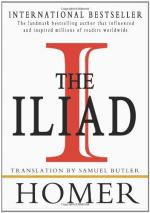|
This section contains 6,846 words (approx. 23 pages at 300 words per page) |

|
SOURCE: Ebbott, Mary. “The Wrath of Helen: Self-Blame and Nemesis in the Iliad.” In Nine Essays on Homer, edited by Miriam Carlisle and Olga Levaniouk, pp. 3-20. Lanham, Md.: Rowman & Littlefield, 1999.
In the following essay, Ebbott interprets Helen's character in the Iliad as the epic personification of blame and of the consequences of righteous indignation.
When Aphrodite tells Helen to go to Paris' bed after he has lost his duel with Menelaos, Helen refuses (Il. [Iliad] 3.410-412):
κει̑σε δ' ἐγoν οὐκ εῒμι—νεμεσσητὸν δἐ κεν εἴη— κείνου πορσανἐουσα λἐχοs· Τρῳαὶ δἐ μ' ὀπίσσω πα̑σαι μωμήσονται· ἔχω δ' ἄχε' ἄκριτα θυμἳ̑.
I am not going to him—it would arouse nemesis— to share his bed. The Trojan women hereafter would all reproach me, and I have endless sorrows in my heart.
Here, after the renewal of the original conflict between Menelaos and Paris, Helen says what the Greeks and Trojans probably wish she had said in the first place—that she will not go to Paris'...
|
This section contains 6,846 words (approx. 23 pages at 300 words per page) |

|


